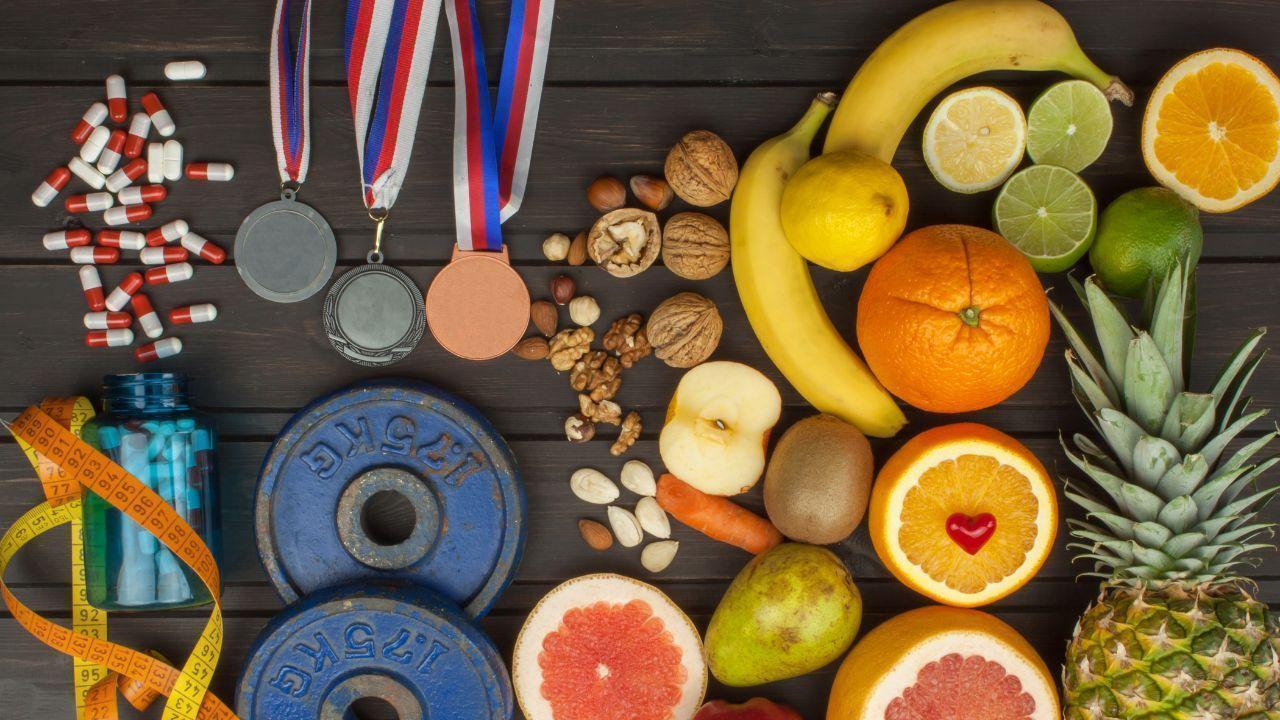
Post by : Zayd Kamal
Athletes across the world know that the key to success lies not just in training, but also in what you fuel your body with. Sports Nutrition and Athletic Supplements play a vital role in enhancing performance, improving recovery, and ensuring the body operates at its best. Understanding how nutrition works in tandem with athletic supplements can help athletes at all levels maximize their potential, whether they are preparing for a competition or just aiming to improve their everyday fitness.
Sports nutrition is much more than eating the right foods—it's about strategically fueling your body to perform at its highest level. Every athlete requires a balanced diet that supports their energy needs, promotes muscle repair, and maintains overall health. Carbohydrates are essential for providing the body with energy, particularly during high-intensity activities. These nutrients are broken down into glucose and stored as glycogen, which is the primary fuel for endurance athletes. Along with carbohydrates, proteins are essential for muscle growth and recovery. After a strenuous workout, protein helps rebuild muscle fibers, ensuring athletes can bounce back quickly. Healthy fats, found in foods like avocados and nuts, support longer-lasting energy during extended exercise sessions. Additionally, vitamins and minerals are necessary to keep the immune system strong and optimize metabolic functions, helping the body adapt to the stresses of athletic activity.
For athletes, carbohydrates are an indispensable part of their diet. These nutrients provide the energy needed for both endurance and strength sports. During physical activity, the body relies on glycogen, stored in the muscles and liver, to supply energy. Consuming a diet rich in complex carbohydrates—such as whole grains, vegetables, and fruits—ensures that glycogen stores are replenished and ready to fuel the body during exercise. Adequate carbohydrate intake is especially critical for athletes involved in endurance sports, like running or cycling, where the energy demand is high and continuous. Without enough carbs, performance can significantly decline, making it crucial to maintain a balanced intake of these energy-rich foods.
Protein is crucial for muscle repair and growth, making it one of the most important macronutrients for athletes. After intense physical activity, muscles experience microtears, which need to be repaired in order to grow stronger. Proteins, especially the amino acids they contain, help rebuild these muscles, facilitating recovery and growth. It’s important for athletes to consume protein consistently throughout the day, with particular attention paid to post-workout recovery. Foods such as lean meats, fish, eggs, dairy products, and plant-based sources like lentils and beans are excellent sources of protein. Consuming protein shortly after exercise—typically within 30 minutes to an hour—can help maximize recovery, reduce muscle soreness, and support the repair process.

While often misunderstood, fats are essential for overall health and athletic performance. Healthy fats, particularly those from sources like olive oil, nuts, seeds, and fatty fish, help sustain energy levels, support cellular function, and aid in the absorption of vital nutrients like vitamins A, D, E, and K. These fats provide a slow, steady source of energy, which is especially important for athletes involved in long-duration activities such as marathons or triathlons. They also help reduce inflammation, which is crucial for recovery after long or intense training sessions. Including healthy fats in a balanced diet ensures that athletes have sustained energy throughout the day and are able to recover effectively post-exercise.
Micronutrients, including vitamins and minerals, play an indispensable role in supporting an athlete's overall health. Although required in smaller amounts than macronutrients, these nutrients are essential for energy production, muscle function, and immune support. For example, vitamin C aids in the repair of tissues and helps prevent illnesses, while vitamin D is critical for bone health and muscle function. Magnesium supports muscle relaxation and helps prevent cramps, while iron is necessary for oxygen transport within the blood, making it especially important for endurance athletes. A diet rich in fruits, vegetables, lean meats, and whole grains helps ensure that athletes get the necessary micronutrients to support their bodies and maintain optimal performance.
While whole foods should always be the foundation of an athlete’s diet, supplements can play a role in enhancing performance and speeding up recovery. However, supplements should never be relied upon as a substitute for proper nutrition; they should be used to complement a balanced diet. Some of the most common sports nutrition and athletic supplements include protein powders, creatine, and branched-chain amino acids (BCAAs). Protein powders, for example, offer a quick and convenient way to increase protein intake, particularly after workouts when muscle recovery is needed. Creatine has been shown to improve strength and power, making it beneficial for high-intensity athletes. BCAAs, on the other hand, help reduce muscle breakdown and promote muscle recovery.
Creatine is one of the most well-researched supplements in the athletic world. It helps replenish ATP, the energy currency of the body, during high-intensity, short-duration activities such as sprinting, lifting, or jumping. Supplementing with creatine has been shown to increase strength, enhance muscle mass, and improve performance in activities that require explosive energy. Similarly, BCAAs, which include leucine, isoleucine, and valine, are essential amino acids that play a role in muscle repair and reducing fatigue. These amino acids are often used by athletes to accelerate muscle recovery, prevent muscle breakdown, and improve endurance during long training sessions.
Hydration is another crucial aspect of sports nutrition. During intense physical activity, athletes lose water and essential electrolytes through sweat. Replenishing these fluids is vital to prevent dehydration, muscle cramps, and fatigue. Electrolyte drinks or powders, which contain sodium, potassium, and magnesium, help maintain fluid balance and support muscle function during exercise. Ensuring adequate hydration throughout the day and especially during workouts is necessary for maintaining energy levels and preventing performance issues related to dehydration.
Timing is critical when it comes to taking supplements. For maximum benefit, it’s important to consume protein immediately after workouts, as this is when muscles are most receptive to recovery. Creatine is often taken before workouts to enhance performance, while BCAAs can be consumed both pre- and post-workout to prevent muscle breakdown. Electrolyte supplements should be used during prolonged exercise sessions, particularly in hot or humid conditions, to prevent dehydration and maintain optimal performance.
The Sports Nutrition and Athletic Supplements Guide provides essential insights into fueling athletic performance through proper nutrition and supplements. It highlights the importance of carbohydrates for energy, proteins for muscle repair, and fats for endurance. Additionally, it covers the role of micronutrients, such as vitamins and minerals, in maintaining overall health and boosting recovery. The article also explores popular supplements like creatine and BCAAs, which enhance performance and muscle recovery. Hydration and electrolyte balance are emphasized as crucial factors in sustaining energy levels during physical activities. By understanding these elements, athletes can optimize their nutrition for peak performance and faster recovery.
This article is intended for informational purposes only. Always consult with a healthcare provider or nutrition expert before making significant changes to your diet or supplement regimen. The information shared here is based on general knowledge and may not be suitable for every individual’s needs.
Disclaimer for readers by DXB News Network.

Winter Skin Care: 10 Hydrating Drinks That Give Natural Glass Skin Glow
Learn how simple winter drinks keep your skin hydrated reduce dryness and support a natural glass sk

10 Songs That Carry the Same Grit and Realness as Banda Kaam Ka by Chaar Diwari
From underground hip hop to introspective rap here are ten songs that carry the same gritty realisti

PPG and JAFZA Launch Major Tree-Planting Drive for Sustainability
PPG teams up with JAFZA to plant 500 native trees, enhancing green spaces, biodiversity, and air qua

Dubai Welcomes Russia’s Largest Plastic Surgery Team
Russia’s largest plastic surgery team launches a new hub at Fayy Health, bringing world-class aesthe

The Art of Negotiation
Negotiation is more than deal making. It is a life skill that shapes business success leadership dec

Hong Kong Dragon Boat Challenge 2026 Makes Global Debut in Dubai
Dubai successfully hosted the world’s first Hong Kong dragon boat races of 2026, blending sport, cul

Ghanem Launches Regulated Fractional Property Ownership in KSA
Ghanem introduces regulated fractional real estate ownership in Saudi Arabia under REGA Sandbox, ena

Winter Skin Care: 10 Hydrating Drinks That Give Natural Glass Skin Glow
Learn how simple winter drinks keep your skin hydrated reduce dryness and support a natural glass sk

Why Drinking Soaked Chia Seeds Water With Lemon and Honey Before Breakfast Matters
Drinking soaked chia seeds water with lemon and honey before breakfast may support digestion hydrati

Morning Walk vs Evening Walk: Which Helps You Lose More Weight?
Morning or evening walk Learn how both help with weight loss and which walking time suits your body

What Really Happens When You Drink Lemon Turmeric Water Daily
Discover what happens to your body when you drink lemon turmeric water daily including digestion imm

DXB News Network Presents “Ctrl+Alt+Wim”, A Bold New Satirical Series Starring Global Entertainer Wim Hoste
DXB News Network premieres Ctrl+Alt+Wim, a bold new satirical micro‑series starring global entertain

High Heart Rate? 10 Common Causes and 10 Natural Ways to Lower It
Learn why heart rate rises and how to lower it naturally with simple habits healthy food calm routin

10 Simple Natural Remedies That Bring Out Your Skin’s Natural Glow
Discover simple natural remedies for glowing skin Easy daily habits clean care and healthy living ti

Mattel Revamps Masters of the Universe Action Figures for Upcoming Film
Mattel is set to revive Masters of the Universe action figures in sync with their new movie, ignitin